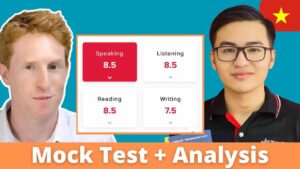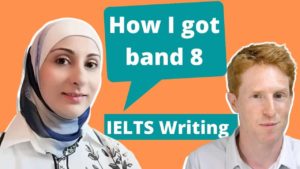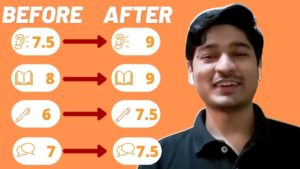Preparing for IELTS at Home
Tips and Strategies for preparing IELTS at home
Here is the breakdown of his score
- Listening: 9
- Reading: 9
- Writing: 7.5
- Speaking: 8.5
- Overall: 8.5
Here is a summary of Ahmad’s advice:
Speaking
- In the test, use language that you feel comfortable with; don’t push yourself to use advanced vocabulary that you are not so familiar with. He said “play it safe”- great advice.
- In your preparation, push yourself to use advanced vocabulary and grammar. Once you have used this advanced language enough, using these advanced structures will become second nature.
- Record yourself answering IELTS speaking questions. Ahmad did this by filming himself on his phone more than 100 times!
Listening
- Familiarise yourself with different accents. Identify which accents you find difficult to understand and make sure to get more exposure to these accents. Ahmad did this by listening to different podcasts (watch the interview to see which podcasts he recommends).
- Do practice tests from the Official Cambridge Past Paper. If you get an answer wrong, spend time to work out exactly why you got it wrong.
- Don’t passively listen to English. Instead, you should make sure that you understand all of the information you are listening to. If there is something you don’t understand, re-listen until you understand the message.
Reading
- Read articles that you are interested in. Try to read so that you understand the article before you focus on learning new vocabulary.
Writing
- Spend most of your revision time on preparing for the writing test- it is the most difficult.
- Write lots of practice essays and reports. After you have written an essay, wait a few days and then read it again to assess and correct it.
- Spend time to learn the public band descriptors. These will help you to self-assess your writing.
- When you read your essays, ask yourself “Will the examiner understand what I have written?” If the answer is no, spend time to work out how you could write your idea more clearly.
- When it comes to idea development, imagine that you are writing to explain your idea to someone that is 5 years old- make it clear and simple.
Vocabulary
- Learn collocations. Ahmad recommends a website called ozdic.com to learn collocations for the common topics that appeared in IELTS.
Studying for IELTS
- Give yourself a long time to study for IELTS. Ahmad gave himself a year to prepare for IELTS. In the beginning, he was just improving his English by listening to podcasts, reading articles and doing the occasional practice test. It was only in the final 2-3 months that he fully devoted his time to IELTS.
- In the final 2 months of his preparation, he did a full practice test every day (reading, listening, writing, and record himself speaking). He did all of this without taking a single break to recreate the test conditions. Some days he would study for 10 or 11 hours a day.
- Push yourself to improve. You have to understand that your IELTS preparation will be difficult at first. However, try to maintain a positive mindset and do your best to improve and little by little the fruits of your labour will appear.
Be ready for the IELTS test with my IELTS Courses!




